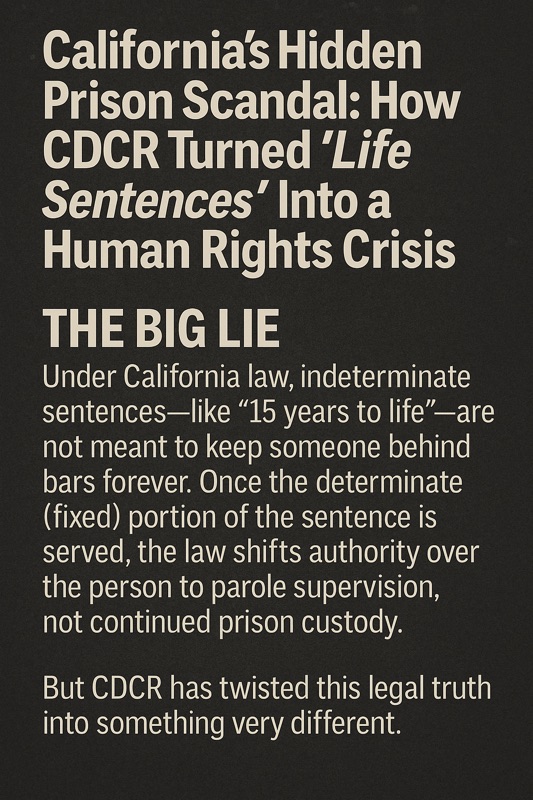
CDCR’s Quiet Power Grab: How California’s Prison Agency Overstepped the Law
By Devon T White
In the heart of California’s justice system, there’s a constitutional principle that is supposed to protect every citizen: the separation of powers. It means lawmakers make the laws, the courts interpret them, and state agencies—like the California Department of Corrections and Rehabilitation (CDCR)—carry them out.
But what happens when an agency quietly alters the meaning of the law, overrides the Legislature’s intent, and assumes powers it was never given?
That’s exactly what critics argue CDCR has done—violating both the spirit and the letter of California law.
Two Jurisdictions, One Overreach
Under California Penal Code § 669(a), there’s a clear distinction between two types of prison sentences:
1. Determinate Terms – Fixed prison sentences (e.g., 5 years). CDCR has jurisdiction over these terms and can keep a person in physical custody until the sentence ends.
2. Indeterminate Terms – Open-ended sentences (e.g., “15 years to life”). These fall under the jurisdiction of parole supervision, not ongoing physical imprisonment once the determinate term has been served.
The law separates these two jurisdictions for a reason—so that no one agency can control every stage of a person’s punishment.
Where CDCR Crossed the Line
According to legal advocates, CDCR has blurred the lines between these two sentencing systems, claiming authority over indeterminate terms that legally fall outside their custody jurisdiction.
By doing so, CDCR has:
• Overridden the Legislature’s intent—ignoring the very structure lawmakers put in place.
• Violated the separation of powers doctrine—a safeguard designed to prevent exactly this kind of overreach.
• Expanded its own power beyond what the law allows, effectively re-writing how sentences are carried out in California.
Why This Matters
This isn’t just a technical legal dispute—it’s a constitutional crisis hiding in plain sight.
If CDCR can overstep here, it sets a precedent for other agencies to bend or ignore statutory limits.
And for incarcerated people, it means serving time they may not legally owe, under an authority that was never meant to hold them.
In a justice system already under scrutiny for racial disparities, mass incarceration, and wrongful convictions, this kind of unchecked power threatens to deepen those injustices.
The Bottom Line
Penal Code § 669(a) is crystal clear: Determinate and indeterminate terms belong to separate jurisdictions. CDCR’s job ends with the determinate term. After that, indeterminate terms are a matter of parole supervision, not continued physical custody.
When an agency ignores that line, it’s not just breaking the law—it’s breaking public trust.
And if we don’t demand accountability, we allow the very institutions meant to uphold justice to undermine it from within.


Comments
Post a Comment